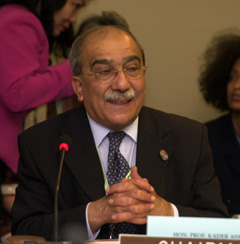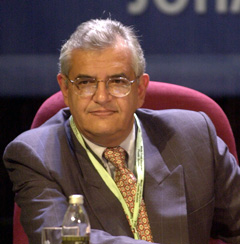 |
|||||||||||||||||||||||||||||||||||||||||||||||||||||||||||||||||||||||||||||||||||||
|
|
|
|
|
|
|
|
|
|
|
|
|
|
|
|
|
|
|||||||||||||||||||||||||||||||||||||||||||||||||||||||||||||||||||||
|
Special Report on Selected Side Events at the WSSD |
|||||||||||||||||||||||||||||||||||||||||||||||||||||||||||||||||||||||||||||||||||||
 |
|||||||||||||||||||||||||||||||||||||||||||||||||||||||||||||||||||||||||||||||||||||
|
|||||||||||||||||||||||||||||||||||||||||||||||||||||||||||||||||||||||||||||||||||||
|
|||||||||||||||||||||||||||||||||||||||||||||||||||||||||||||||||||||||||||||||||||||
|
Voices of Reality – Communities and Sustainable Development |
|||||||||||||||||||||||||||||||||||||||||||||||||||||||||||||||||||||||||||||||||||||
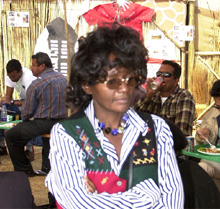 |
|||||||||||||||||||||||||||||||||||||||||||||||||||||||||||||||||||||||||||||||||||||
|
Esther Mwangi, UNDP, underscores the importance of SGP projects financially rewarding communities. |
|||||||||||||||||||||||||||||||||||||||||||||||||||||||||||||||||||||||||||||||||||||
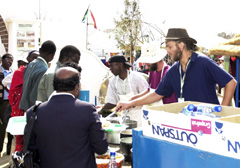 |
|||||||||||||||||||||||||||||||||||||||||||||||||||||||||||||||||||||||||||||||||||||
|
Esther Mwangi, UNDP, introduced a SGP project in Uganda under which inmates from a prison collect invasive water hyacinths, and process these into products, including furniture and handbags. She noted that the SGP project complements a larger GEF project, addressing the problem of invasive water hyacinths. Mwangi underscored the importance of: good marketing of generated products; involvement of the private sector; replicability of projects; and income generation. |
|||||||||||||||||||||||||||||||||||||||||||||||||||||||||||||||||||||||||||||||||||||
|
|||||||||||||||||||||||||||||||||||||||||||||||||||||||||||||||||||||||||||||||||||||
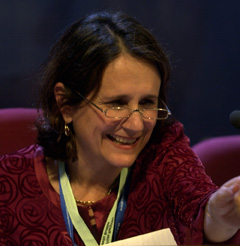 |
Launching of the women's action agenda for a healthy and peaceful planet 2015 |
||||||||||||||||||||||||||||||||||||||||||||||||||||||||||||||||||||||||||||||||||||
|
Thais Corral, REDEH, said that extensive consultations were held in order to revise Women's Action Agenda 21. |
|||||||||||||||||||||||||||||||||||||||||||||||||||||||||||||||||||||||||||||||||||||
|
Rachel
Kyte, the World Bank, stressed that women were responsible for underscoring the links between environment and health, human rights and population at the international level. She noted the need for accountability and to introduce the WAA to places where women are under-represented. |
|||||||||||||||||||||||||||||||||||||||||||||||||||||||||||||||||||||||||||||||||||||
|
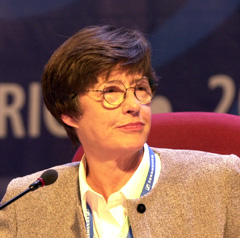 |
||||||||||||||||||||||||||||||||||||||||||||||||||||||||||||||||||||||||||||||||||||
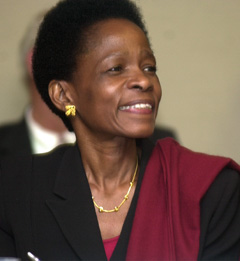 |
|||||||||||||||||||||||||||||||||||||||||||||||||||||||||||||||||||||||||||||||||||||
|
Water For African Cities |
|||||||||||||||||||||||||||||||||||||||||||||||||||||||||||||||||||||||||||||||||||||
|
Anna Kajumulo Tibajuka, Executive director of UN-HABITAT, highlighted water as a key indicator on how countries manage development. |
|||||||||||||||||||||||||||||||||||||||||||||||||||||||||||||||||||||||||||||||||||||
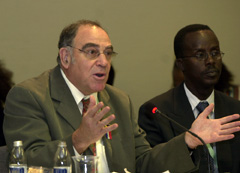
Ronnie Kasrils, South African Minister for Water Affairs and Forestry, speaking about Johannesburg city as a model for the UN-HABITAT Programme on water for African cities.
Listen to Richard Dolly, Chairman of the Water Supply & Sanitation Collaborative Council.
|
||||||||||||||
Global pillage? Maintaining Local Values In A Globalizing World
Presented by IUCN, ICTSD (International Centre for Trade and Sustainable Development), and CEESP (Commission on Environmental, Economic and Social Policy)
Wiseman Nkuhlu, New Partnership for Africa's Development, highlighted the need for African leaders to adopt leadership responsibilities, including: accountability; developing participative mechanisms; and fulfilling international commitments. He emphasized the importance of developing relationships with developed countries on trade, debt, investment, and participation in global processes.
Mark Heywood, AIDS Law Project, highlighted the link between health and sustainable development and the challenges posed by the spread of HIV and the lack of access to medicines. He identified the HIV epidemic as an example of globalization of disease, and noted that treatment of HIV in developed and developing countries cannot be the same. He also noted the failure of global market research, production and distribution mechanisms to work equitably. He underscored the need to develop legally binding provisions on the human right to health.
Mark Moody-Stuart, Business Action for Sustainable Development, underscored that the development of local governance structures is an essential means to ensuring equity. He said the private sector should promote positive business behavior and highlighted the commercial advantages for businesses to support and respect local values.
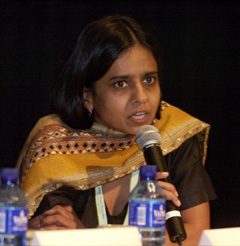
Sunita Narain, Centre for Science and Environment, stresses the need to identify the most appropriate local democratic framework for integrating global markets and local values.
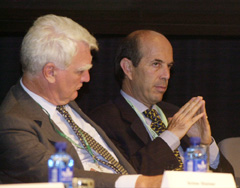
Mark Moody-Stuart (left) with Ian Goldin
Sunita Narain, Centre for Science and Environment, suggested identifying the best local democratic framework for integrating global markets and local values. She stressed the need to respect local communities' rights and recommended that ethics drive the globalization process.
Ian Goldin, The World Bank, drew attention to the management of globalization and defined equity as the power of local communities to determine their future. He highlighted the need for World Bank projects to be determined by local needs.
Alain Lipietz, European Parliament, stressed the development of universal values on the basis of common local values for reshaping global trade to ensure sustainable local development, and urged cultural diversity for maintaining biodiversity.
Yolanda Kakabadse, IUCN, equated globalization with inequity, and said that competitiveness and lack of solidarity are the most apparent consequences of globalization. She called for an inclusive international code of ethics.
|
||||||||||||||
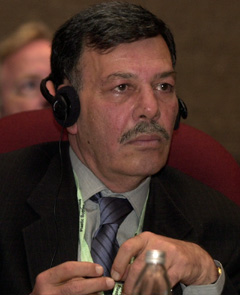
Participatory Democracy And Good Governance As Fundamental Tools For A Human Rights Approach To Sustainable Development
Presented by the Council of Europe, the Regional Environmental Center for Central and Eastern Europe (REC) and the United Nations Economic Commission for Europe (UNECE)
Brigita Schmögnerová, UNECE, described the process of developing the Aarhus Convention on Access to Information, Public Participation in Decision-Making and Access to Justice in Environmental Matters. She pledged support for developing guidelines on public access to information in the Asia-Pacific Region.
Cheryl Gillwald, South Africa, stressed the need to address inequality in order to bridge the gap between ambitious human rights goals and delivery on the ground.
Božo Kovačević, Croatian Minister of Environmental Protection and Physical Planning, explained that a wide range of instruments is needed to achieve good governance goals .
Víctor Lichtinger, Mexican Minister of Environment and Natural Resources, highlighted the need for new institutions and noted costs involved in enabling access to information and public participation. He called for cooperation mechanisms to facilitate implementation of existing legislation in developing countries.
Olivier Deleuze, Belgium, described a participatory process of formulating a federal plan for sustainable development in Belgium.
Gabriella Battaini-Dragoni, Council of Europe, introduced a political message from the Committee of Ministers of the Council of Europe to the WSSD, which promotes a human rights-based approach to sustainable development; and she also described the Council's efforts to develop legal instruments for environmental protection, including laws to combat corruption.
Shafqat Kakakhel, UNEP, highlights the importance of cooperation with the countries that currently lack capacity to fully implement the Rio Principle 10.
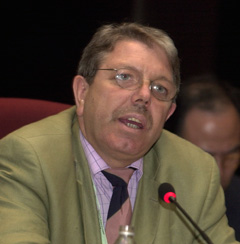
Alan Meale, UK
Svitlana
Kravchenko, European ECO Forum, described the unique role of
civil society in the development, promotion of ratification and
implementation of the Aarhus Convention.
Alexander Juras, REC, outlined preconditions for good governance, including: new and independent institutions; internationally binding agreements; and the recognition of a fundamental human right to good governance.
Shafqat
Kakakhel, UNEP, stressed the urgency of promoting human rights in the context of globalization, and outlined UNEP efforts to identify mechanisms for implementation of Rio Principle 10 (Access to Information) and the linkages between human rights and environmental protection.
Ben
Turok, South Africa, addressed complexities in addressing good governance, including the need to create new institutions and reform public services. He expressed concern that the current global order will remain exploitive and unequal, and called for greater equality and respect for human rights
Alan
Meale, UK, underscored the success of the European Union in enabling democratic processes and implementing Agenda 21. He stressed the need to further engage the public in decision-making.
|
||||||||||||||
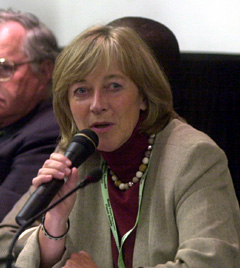
Water, climate and Agenda 21: Action by local government
Presented by the International Council for Local Environmental Initiatives
(ICLEI)
Kaarin Taipale, ICLEI, stressed the importance of implementing sustainable development at the local level.
She called for acknowledgment in the WSSD political declaration of local governments' capacities.
Parks Tau, City of Johannesburg, and Patrick Karangwa, Mwanza, outlined the successes of, and challenges in, providing water and electricity to African cities. Tau urged the Summit to ensure global scale access to water, and called for agency and government support in local initiatives.
Beate Weber, City of Heidelberg, outlined the factors of successful implementation of Local Agenda 21 by a local government, including communicating with the public; developing consistent development strategies; and reporting to communities on progress achieved.
Bill Wood, Australia, described the participation of Canberra in the Cities for Climate Protection Campaign. He explained that the city's efforts to curb greenhouse gas emissions include developing transportation policies and exploring new energy sources.
Beate Weber, City of Heidelberg, stresses that a local government should set an example to its community by pursuing sustainable practices.
Judy Walker, ICLEI, called for moving from words to action in the post-Johannesburg decade with a focus on viable local economies and empowered, peaceful, eco-efficient and resilient communities. She stressed the need to build capacity at the local level, and employing available environmental management tools, including eco-procurement and investment.
Jacqueline Aloisi de Larderel, UNEP, stressed the importance of: integrative thinking; clear goals; monitoring of results, and the sharing of experiences. She highlighted UNEP's role in assisting local communities to move toward sustainable development.
Khalid Mohtadullah, Global Water Partnership (GWP), stressed the importance of dealing with water issues at all levels, and welcomed long-term partnership between ICLEI and the GWP.
Harvey Ruvin, Miami-DADE called for optimism in efforts to resolve sustainable development challenges, and compared ICLEI and local authorities with a beacon pointing toward sustainability.
|
||||||||||||||
Frontier governance and sustainable development in Amazonia
Presented by the Amazon Institute of Environmental Research (IPAM), the Instituto Socioambiental and the Amazon Working Group (GTA)
Ana Barros, IPAM, highlighted the importance of the Amazon for biodiversity and for the regional and global climate and noted that deforestation, logging and fire are the region's greatest threats. She said that the Brazilian government provides incentives for continued destruction of natural resources, and criticized the government's plans for the region to increase infrastructure instead of focusing on enforcement. She said that current plans for improving roads would result in increased logging and suggested frontier governance as an alternative. She called for better governance through, inter alia: stakeholder involvement in the decision-making process; effective solutions to land tenure problems; sustainable use of legal reserves; demarcation of indigenous lands; and land use monitoring.
Adilson Vieira, GTA, explained that the GTA is a civil society attempting to fight inequalities within the 1992 Rio convention's framework. He noted continuing threats to and pressure on local communities and called for a more ethical approach in order to secure the natural and cultural diversity of the Amazon.
Juliana Santilli, Instituto Socioambiental, presented a report on the protection of traditional knowledge in Brazil. She described a recent presidential decree establishing principles and directives to implementat the national policy on biodiversity. Santilli stated that two bills currently discussed by the National Congress would make biopiracy illegal and increase NGO participation genetic resources management.
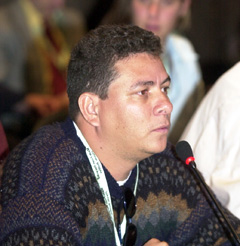
Adilson Vieira, GTA, says that biopiracy, land rights violation, dams and sawmills create a tremendous pressure on local Amazonian communities.
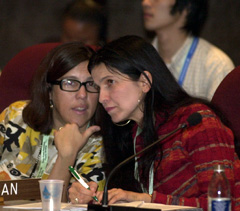
Juliana Santilli, Instituto Socioambiental, right
|
||||||||||||||
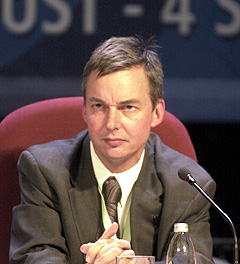
Capacity Development for Sustainable Development: From Words to Action
Presented by the Leadership for Environment and Development (LEAD)
Richard Holme, LEAD, said that the event aimed at identifying ways to provide and finance capacity development. He presented two models for business engagement in developing countries: without involving the local communities; and involving them through contracting local suppliers, technology transfer and employees training. He stressed the importance of management training at all levels.
Philip Dobie, UNDP, described his experience as manager of the Capacity 21 programme. He highlighted the need to move from donor-priorities for knowledge transfer toward models
based on entrusting people to make decisions and providing the necessary resources.
Julia Marton-Lefèvre, LEAD, described LEAD's network and activities of leadership capacity building for sustainable development through enhancing: technical and negotiation skills; cross-cultural communication; and ethical aspects.
John Ashton, British Foreign and Commonwealth Office, noted that elements of capacity building for sustainable development are, inter alia: human networks; understanding the consequence of decisions; and designing policies that go beyond traditional boundaries.
Timothy Wirth, United Nations Foundation (UNF), identified leadership as the horizontal and neutral behaviour that helps to mobilize resources and form partnerships. He described UNF actions as intermediary in the environmental and the financial field.
Alvaro Umana, UNDP, stressed know-how, mobilization of resources and skills, and political will and leadership to help countries in achieving sustainable development.
John Ashton stresses that capacity is at the heart of sustainable development.
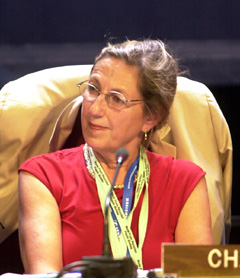
Kristalina Georgieva, the World Bank, identified necessary trends for capacity building sustainable development, inter alia: ensuring that children attend and complete primary education; securing quality of education and knowledge; and turning passive learning into active learning.
Hans van Ginkel, United Nations University, stressed the need to focus on both capacity development for individuals and for institutions. He urged creation of networks and development of indigenous capacities.
Discussion: Participants emphasized the importance of also developing capacity during childhood, and developing capacity of the media.
Julia Marton-Lefèvre describes LEAD's leadership building activities.
|
||||||||||||||
|
Any irregularities on this page? Please mail the Digital editor
